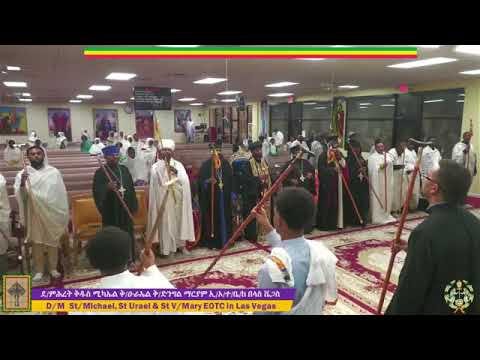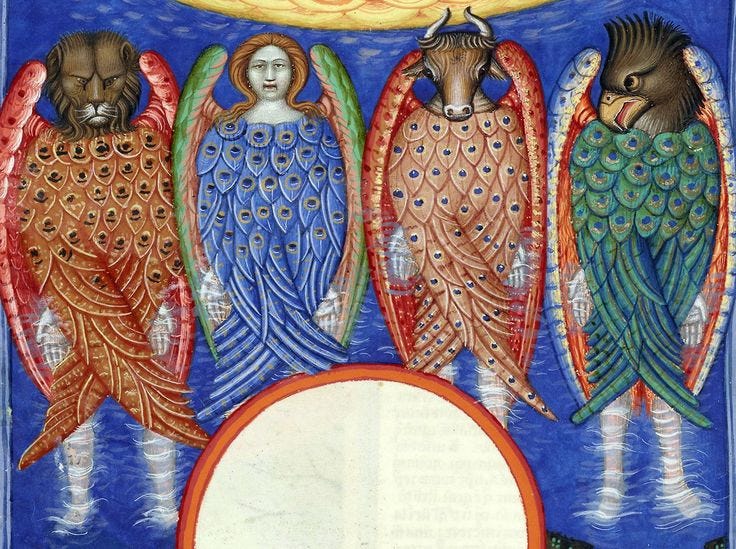I have written about St. Michael the messenger of yahweh and aristocratic military leader of yahweh’s army here (2014) and here (2023), spoken of him here (2017?), footnoted him here (2014), and had a guest author mention him in passing here. Last week, I taught about him in The City of Sin, under the auspices of His Beatitude Archbishop Theophilus, and alongside the debtera who praise yahweh frequently in non-eucharistic liturgies.
May it never be said of me that I, “speak evil of glorious ones.” Speaking of glorious ones, we have an English-speaking spiritual tsiwa mahber (goblet-fellowship) devoted and dedicated to commemorating the four incorporeal beasts of the Scroll of Ezekiel and John’s Apocalypse.
And before the throne there was a sea of glass like unto crystal: and in the midst of the throne, and round about the throne, were four beasts full of eyes before and behind. And the first beast was like a lion, and the second beast like a calf, and the third beast had a face as a man, and the fourth beast was like a flying eagle. And the four beasts had each of them six wings about him; and they were full of eyes within: and they rest not day and night, saying, holy, holy, holy, Lord God Almighty, which was, and is, and is to come. (4:6-8)
If you have faith—the substance of things hoped for, the evidence of things not seen—a tsiwa mahber is all you need. Most of the time. What do I mean? Let us look at the particular history of expansion and contraction EOTC parishes in Southern California as a microcosm of the universal church.
We have about ten parishes in SoCal, and they almost all are rooted in local divisions and schisms and micro-fractures. Two were opened peacefully, in order to accommodate parishioners who live far away. One of these parishes opened peacefully has had a recent hubbub over a move from one rental site to another ~20 miles away, thereby partially defeating the original purpose of gathering as a tsiwa mahber and transitioning into a building. Here’s a novel idea, do not transition.
In this particular case, there is a Coptic parish close by where the faithful can receive Holy Communion. Some say to commune weekly. This is great when and where it is possible. My father confessor advised me to always commune at least three times a year, and absolutely never less than once a year. As a deacon, you can take an educated guess that I pass these numbers by a factor of about 15. The eucharist is the only thing missing from a tsiwa mahber. In a small group, you can read aloud Scripture, patristics, daily prayers, and sing Psalms and spiritual songs.
A lack of faith (superlative trust in God) makes us rush to build a house for yahweh, even when we can hardly afford it. The tsiwa mahber model allows a small community to slowly raise money with low expenses. Meeting at the richest amongst you’s home, or a public place, is not demeaning. It is a demonstration of your faith. And a lot of work can be done in these spaces, for those with the vision and patience to sow the seed of his life giving word, whether they see the fruit in their life time or not.
In our patristic brotherhood, led by the incomparable Dcn. meharee zemelak werqu, we are studying St. Ignatius of Antioch. Some say this frequently cited quote is apocryphal, “where the bishop is, there is the church.” Apocryphal or not, it captures the spirit of the Early Church. And most of the parishes started with an evil spirit were started in direct opposition to a bishop. This is what Jude teaches against (those who despise dominion and reject authority).
There is a time and place and role for everything under the Sun.
P.S.
The St. Michael way’zéma (eve hymns before a high-holiday) say,
መርሖሙ መዓልተ በደመና
ወኵሎ ሌሊተ በብርሃነ እሳት
merhomu me3lte (mealte) be’demena
we’kwilo léleete be’birhane isat
he guided them by day with a cloud
and in all the night with the light of fire
(from the same Psalm 78 that Fr. Marc translated himself)
Fr. Paul Nadim Tarazi exegetes the light of fire in the cloud not as the electricity of N.A.T.O. countries, but a functional light to see and a light of judgment from the one god. Hear his debarim (utterances), again and again.



